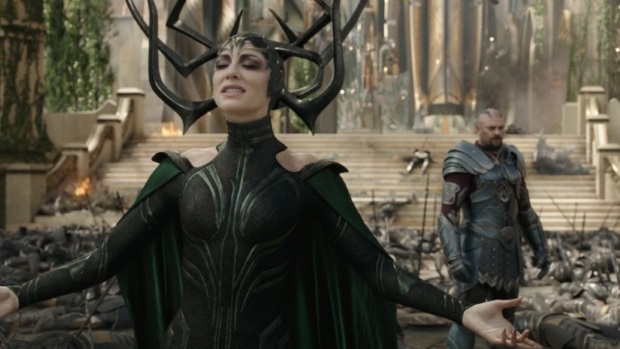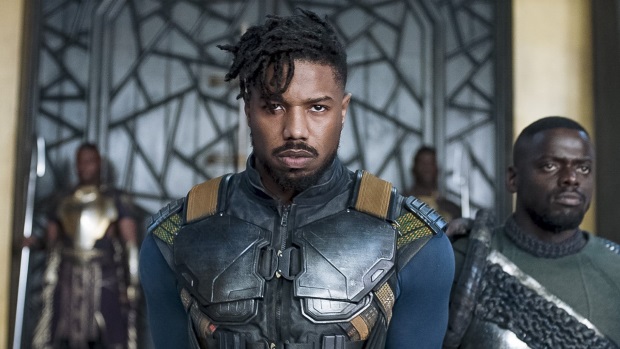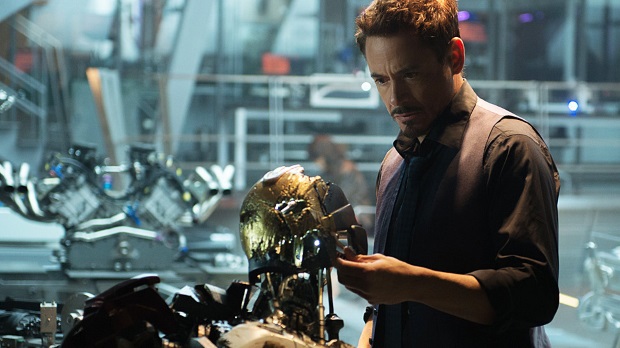Black Panther, Marvel’s Heroes, Their Past Wrongs & Atonement
From Black Panther to The Avengers, how Marvel's heroes try and put the world right...
This feature contains spoilers for many movies from the Marvel Cinematic Universe, up to and including Thor: Ragnarok and Black Panther, and some speculation about Avengers: Infinity War.
“A famous man once said ‘We create our own demons.’ Who said that? What does that even mean? I said it cause he said it.”
In 2008’s Iron Man, Tony Stark has a spell in captivity that forces a change in perspective. Marvel’s whole cinematic universe began, with the story of a genius inventor turning his back on the weapons manufacturing trade in order to try and make the world a better place as Iron Man instead. Since then, the theme of atonement, and heroes bringing themselves to terms with their past through conflict and/or catharsis, has been a pillar of almost every film in the series.
Marvel’s output is sometimes criticised for being samey, either on an aesthetic level, or in the superficial diagnosis of ‘comic book movie fatigue’ that some film writers like to bandy around. There’s a house-style to this unparalleled franchise, yes, but there’s also an insistence on the theme of atonement that might lead some commentators to point out the similarities in storytelling.
There’s a shape to the plots of these movies that feels familiar, but it’s uncanny how Marvel’s last two films in a row, Thor: Ragnarok and Black Panther, are both doing very similar stories. A prince who loses his father, but discovers a dark secret kept by the royal family before he can inherit the throne, and comes into conflict a previously unknown relative who seeks revenge for being wrongly scrubbed out of history. Spot the difference?
There’s a tonal gulf between the hilarious space opera and the action drama about spies and royal intrigue, but the similarities between these two films, and their proximity on the release schedule, serve to emphasize the stark theme of atonement for past wrongs, from different angles. And speaking of Stark, the fact that this trope goes all the way back to Iron Man suggests how these two films might also be setting the board for the MCU’s (so-called) endgame, which will begin in Avengers: Infinity War.
Historic wrongs

“Odin – proud to have it, ashamed of how he got it…”
In Thor: Ragnarok, the God of Thunder discovers that the Nine Realms have been left vulnerable by his brother Loki, who has disguised himself as their father Odin and begun a hedonistic reign as King of Asgard. When the real Odin dies in exile on Earth, his forgotten eldest child Hela, who helped him to settle the galaxy with violence and bloodshed, is released to wreak havoc once again.
Although Taika Waititi’s film is outwardly more comical, the film’s commentary on colonialism, its fallout and its largely whitewashed effects, is thematically strong throughout – even the bright and funny locale of Sakaar, run by Jeff Goldblum’s Grandmaster but built on slaves (or “prisoners with jobs” as he squeamishly calls them), makes a statement about how wrong itself is, but it’s Asgard that underpins the film.
In Hela, we have a villain who’s not only bloodthirsty and amoral, but annoyed that nobody, but nobody remembers who she is. We see two murals of Asgard’s history in the throne room, but it’s the second, which has been painted over by Odin to represent the more peaceful values that Asgard purports to represent, tells the true story. Like the Grandmaster, the Allfather has presented an image of himself as a benevolent guardian of the galaxy, which belies his violent past. In trying to bury his daughter rather than acknowledging her, he creates a monster that threatens his children and their future.
The challenge this presents to Thor, who learned a lesson in humility in the first film and further chose to abdicate the throne at the end of The Dark World, is ultimately solved by him invoking the apocalypse that he dreaded. Ragnarok transpires, after he, Loki and other allies have evacuated Asgard’s people, so that they can still become the society they presented themselves to be, rather than fighting to maintain the status that they’ve built around it. Thor sacrifices his home world to Surtur to stop Hela and save the people, even though it means an uncertain future as refugees.
Given the enormity of the historic wrongs that come to the fore here, it’s the kind of grand gesture that plays in the four-colour comic book of a film in which Waititi so amusingly cloaks its deeper themes. Ahead of Infinity War, that uncertain future is already looking bleak by the end of the first post-credits clip, with Thanos’ ship dwarfing the Asgardians’. The price of their atonement will be that they’re vulnerable to a mad titan at precisely the moment the universe could use some big shiny protectors.
But in the main, the historic wrongs of the MCU are recent enough that they feel like personal wrongs for the characters, and they are, remarkably, mostly within one decade. For Marvel, as someone who once played an Iron Man antagonist put it in another film, in Darren Aronofsky’s The Wrestler – “The 90s fucking sucked, man.”
Personal wrongs

“You are a good man, with a good heart. And it’s hard for a good man to be a king.”
Black Panther opens in Oakland, California in 1992, in an apartment where two men plan a robbery. They’re interrupted by King T’Chaka and the Dora Milaje, at which point we learn that both men are undercover agents from Wakanda. One of them is the king’s brother N’Jobu, and he has recently helped arms dealer Ulysses Klaue to infiltrate Wakanda and steal precious vibranium, killing their citizens in the process.
Director and co-writer Ryan Coogler revisits this setting a couple of times through the rest of the film, including when the other agent, Zuri, reveals to T’Chaka’s son T’Challa that the king killed his own brother to save his life. The king then lied to his people and said that N’Jobu had disappeared, knowingly abandoning his nephew N’Jadaka “to maintain the lie.”
While Zuri feels guilty that this happened to save his life, it’s the abandonment of N’Jadaka that is unforgivable. Wakanda, like Asgard, is a utopia whose rulers are bent on maintaining it, and their conservative attitude to keeping their status secret from the rest of the world is the main challenge facing T’Challa when he first takes the throne – his ex Nakia won’t come home while she can be abroad, helping the refugees that Wakanda won’t accept in its isolationist stance.
When N’Jadaka resurfaces as Killmonger, he’s such an effective villain because we can completely see where he’s coming from, and to a certain extent, so can T’Challa. That much is marked by the difference in his two encounters with T’Chaka on the ancestral plain, the first is bittersweet and apologetic in the face of failing to save him in Captain America: Civil War, while the second has the young king remonstrate his ancestors for creating the circumstances that led them here.
Including Ragnarok, a fair few Marvel movies have their heroes muddle through conflicts between their mentors or villains by going “actually, no, also this third way”, but Black Panther really grapples with what that means emotionally. T’Challa mishandles Killmonger when he arrives in Wakanda, resulting in a dramatic showdown with the council. Diplomacy isn’t going to cut it with the angry soldier, but their confrontation still goes about as badly as it possibly can even before the king is marmalised in ritual combat.
Don’t hashtag me by the way – T’Chaka was wrong, but that doesn’t entirely make Killmonger right. We see in his own visit to the ancestral plain, back in that Oakland apartment, that his anger, radicalised by his time in the US army, clouds any point that he might have, and in his treatment of his “fellow brothers and sisters” both before and after he gets the throne, we see that he’s not so dedicated to protecting them as he claims. He’s probably Marvel’s best villain to date, partly because of the script and partly because of Michael B. Jordan’s performance, but he’s not in the right.
In facing Killmonger, T’Challa has to reckon with the historic isolationism that created him as well as the personal wrong that his father did to their own blood. It’s their irreconcilable differences as much as Hollywood action movie plotting that means it ends with Killmonger dead, but in their final scene, and the subsequent decision to share Wakanda’s knowledge and resources with the world, we see the value of T’Challa truly atoning for the past. “Wakanda will no longer watch from the shadows,” he tells the United Nations. “We can not. We must not.”
Again, his timing is spectacular, given how Thanos is headed for Earth, and it looks from the trailer like Wakanda is going to be a major battleground in Infinity War, but the forecast of Black Panther‘s post-credit scenes is at least more positive than where we left Thor. And besides, there’s another character whose every wrong move has come out of reacting to the coming threat.
Wrongest Avenger

“The futurist is here! He sees all! He knows what’s best for you, whether your like it or not.”
Avengers was a major turning point in Tony’s arc, turning him into a more reactionary character as he suffers from PTSD, tries to futureproof against alien attacks and ends up turning on his own teammates. But it’s also the only movie in which he appeared in which he is not responsible for the emergence of the antagonist, and his mistakes only become bigger after that point.
In his own movies, Obadiah Stane, Ivan Vanko, Justin Hammer and Aldrich Killian are all corporate rivals to various extents, but in the crossover movies, the villains come out of his wrong-headed decisions over time. Ultron is his misguided effort to “end a war before it happens”, as Captain America puts it. The artificial intelligence he creates turns his own conscience against him, attempting to make peace by wiping out the planet and starting over. Tony also causes a big fight with his fellow Avengers by trying to do the same thing with Vision, even though that works out better.
That all winds up in the Sokovia disaster, which leads to the events of Civil War. Even if you’re on Team Iron Man, and there’s no denying that Tony tries to be reasonable to Cap for as long as he can, he has to reckon with his mistakes after getting most of his Avengers teammates locked in the maximum security prison on The Raft.
Even in Spider-Man: Homecoming, in which Tony only plays a supporting role, he inadvertently creates a villain for Spider-Man in contractor Adrian Toomes, who bristles at his Damage Control “getting paid to clean up a mess he made”. Given Stark’s track record, wouldn’t it be funny if the MCU versions of future Spider-Man villains were all kids who had their projects funded by his September Foundation, introduced in Civil War as a fund for the next generation of mad scientists? Best watch that none of them have a set of mechanical arms.
On the path he has taken to avoid disaster, he has wound up turning various forces against him, from the government to the flight-suit equipped man on the street, and whittling down his Avengers line-up to a paralysed Rhodey, a demoralised Vision and the teenage boy he’s simultaneously encouraging and trying to keep out of harm’s way.
We don’t think Marvel head honcho Kevin Feige has had any of this planned from the beginning – not least because of the way subsequent films have had to walk Tony back from the cathartic ending of Iron Man 3 – but the major players have developed by reckoning with their mistakes in such a way that has dismantled the team that won the day during the Battle of New York, right before an even bigger onslaught from the same enemy.
The Avengers are scattered, SHIELD is no more (except, however implausibly, in TV land), and Thanos is coming. Meanwhile, Thor is down a hammer and an eye, shepherding his people around the universe, and T’Challa has opened his country up to the threat of destruction, not by the rest of the world, but by a force from another world. Sometimes, it’s hard to do the right thing, and it’s about to get harder.
Story consequences sometimes seem lighter than they ought to be in the to-and-fro of a vast franchise like this one, but Phase 3’s emphasis on personal stakes and atonement has developed Earth’s Mightiest Heroes into a much more precarious position. With contracts up, Infinity War and its untitled sequel are broadly speculated to be the end for a number of the key players, and over the course of recent films, the development of the characters’ collective conscience might just be the deciding factor.